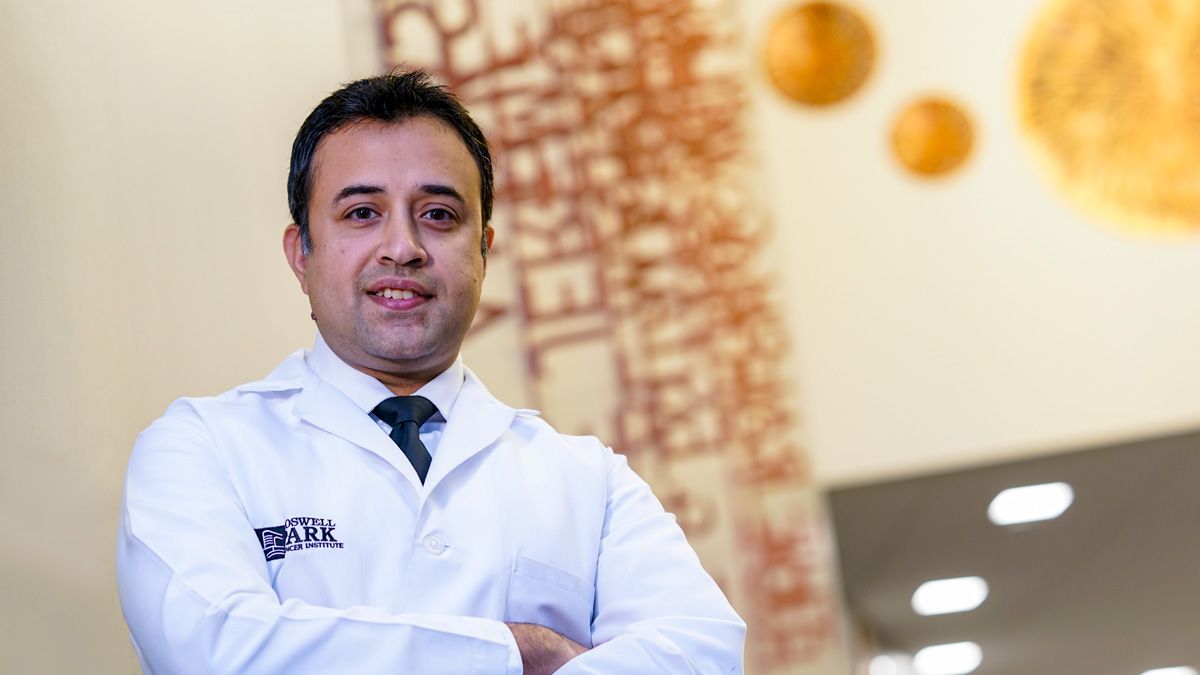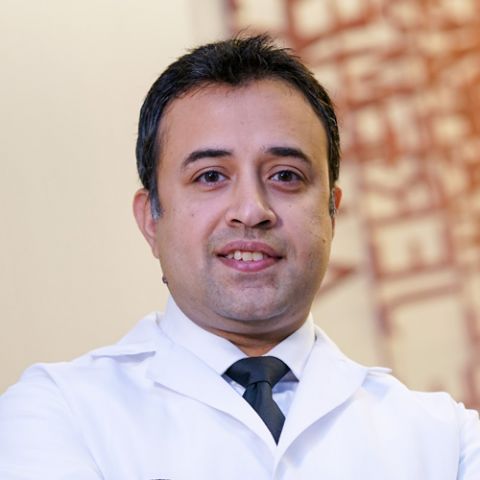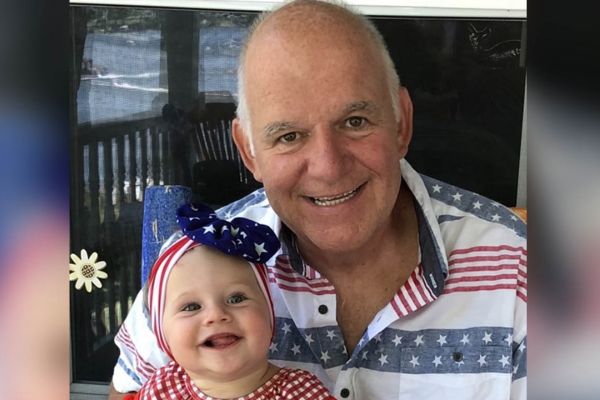What you should learn about their experience, complication rates and more before deciding where to undergo cancer care.
If you’ve been diagnosed with cancer of the esophagus or the gastroesophageal junction (the area where the esophagus meets the stomach), surgery will likely be a primary part of your treatment. These operations are complicated, with potentially lifelong implications, so you want to choose a surgeon and treatment center with the experience to offer you the best chances for positive outcomes in terms of effectively treating your cancer and your quality of life.
How do you make that choice? Here are some questions to ask a potential surgeon to find the right place for your care.
How many of these procedures have you done?
Experience from performing a high number of these difficult operations matters. “These are still uncommon cancers, with only 30,000 to 40,000 cases diagnosed annually, nationally,” says surgical oncologist Moshim Kukar, MD, Chief of Upper Gastrointestinal, HPB and Endocrine Surgery at Roswell Park Comprehensive Cancer Center. “And the procedures are extremely complex.”
You want a surgeon with a long, proven track record of success, and a medical center that is considered “high volume,” which he says means more than 25 esophagectomies a year. “At Roswell Park, we do 60 to 70 a year,” he says. “We also do 40 to 50 gastric operations a year.”
Additionally, you want a surgeon and a team of specialists that can correctly diagnose which of the three subtypes of gastroesophageal cancer you have. “This is extremely critical for good outcomes,” he says. “The surgeon must be involved from the initial visit, for thorough staging and preoperative planning. Make sure your surgeon is familiar with all types of gastric and esophageal operations, because there are multiple ways to approach these cancers through several techniques.”
Do you perform robotic surgery for esophageal cancer?
Minimally invasive approaches are far better for the patient — faster recovery, less pain, shorter hospital stay, fewer complications, quicker resumption of additional treatment as needed — and robotic surgery takes it to another level.
“More than 90% of these operations can be accomplished with small incisions, and we have done over 500 minimally invasive esophagectomies over the last decade here at Roswell Park,” Dr. Kukar says. “The data, here and around the world, is that robotic surgery delivers the best outcomes.”
The reasons for this are multiple and include the 3D visualization, stable platform, greater range of motion and extremely precise fine movements that surgeons gain with robotic surgery. “It’s important to stress that the robot is not doing the operation, it’s the surgeon who manipulates and controls the instruments from a console in the room. The robotic arms move the same way the surgeon’s hand moves and is extremely accurate in placing sutures and creating connections.”
Unlike with traditional, "open" surgery, patients undergoing minimally invasive surgery don’t need to recover in the intensive care unit and are up and walking the next day. Patients typically have a shorter hospital stay of six to seven days, as opposed to two weeks or more with open, large incision surgery.
Why Roswell Park for the treatment of esophageal cancer?
The treatments we offer for your specific cancer are at the forefront of cancer care — plus clinicians with the knowledge and experience to use them.
What complications might occur and how common are they?
You should talk with your surgeon about potential complications and ask how often these occur at their center. “We have made several modifications to this surgery over the last decade to refine our technique and perfect outcomes,” says Dr. Kukar. You can compare a center’s outcomes to those compiled from an international cohort of robotic esophageal surgeons at high volume centers. (There are no multicenter cohort national comparisons like this, he notes.) The four most common complications that you should know include:
- Anastomotic leak which means that gastric materials leak at the new juncture created between the stomach and esophagus after the cancer is removed. Typically, at high volume centers, this can occur in 10 to 33% of cases. At Roswell Park, it occurs in just 2%.
- Pneumonia/infection. Postsurgical infections, including lung infections like pneumonia, may result after long and complex surgeries under general anesthesia in up to 25% of these cases. At Roswell Park, our pneumonia/infection rate for these operations is 5%.
- Lymphatic leak. The lymphatic channel called the thoracic duct courses through the right chest and can be damaged during the procedure in about 10 to 15% of cases. At Roswell Park, our rate is 2%.
- Stricture. This longer-term complication in which the new connection between the stomach and esophagus narrows over time, requiring repeated endoscopic dilation procedures, may occur in 5 to 25% of cases. At Roswell Park, stricture occurs in just 1%.
How do you minimize long-term side effects?
After the operation, long-term side effects such as reflux, excessive weight loss, dumping syndrome (where the stomach empties too quickly) and others can develop in some patients and adversely affect quality of life.
“We perform some unique things at the time of procedure to minimize these side effects,” explains Dr. Kukar. “We perform a side-to-side 6 cm stapled anastomoses as compared to conventional 25 mm end-to-end anastomoses, double flip technique to assure that new conduit is laying well across the diaphragm which minimizes both reflux and stricture rate.
"We also have unique, complex surgical options we can do that spare more of the stomach and/or novel reconstruction techniques to improve optimal function and quality of life,” Dr. Kukar says. These options include intragastric surgery, double tract reconstruction after proximal gastrectomy and jejunal pouch creation after total gastrectomy.
“These may add time to the overall procedure, but they are very beneficial for the patient long term,” he says.
Why is it important to be treated at a National Cancer Institute-designated comprehensive cancer center?
Given that esophageal and gastroesophageal junction cancers can be complex and aggressive, outcomes are best when delivered by a team of specialists who can discuss and coordinate each patient’s care.
“Every single case is presented at our tumor board meeting every Wednesday morning,” Dr. Kukar says. Pathologists, radiologists, nuclear medicine physicians, surgeons and medical oncologists meet to outline the sequence and the kind of treatments that each patient needs. “It’s not just tumor factors, it’s also patient factors, such as their overall health, lung and heart function and social and environmental factors.
"We account for all those factors to outline the best treatment approach for each individual patient.” Some patients are even put into pre-surgical rehab with a physical and or pulmonology therapist, a nutritionist or other specialist to improve their health before they undergo the operation.
“We want to optimize them for the best possible outcomes,” he says. "In addition to the surgical expertise, we have dedicated team of mid-level providers, nurse coordinators, anesthesia and nursing teams and a standardized postoperative recovery pathway that help us achieve superior outcomes."




